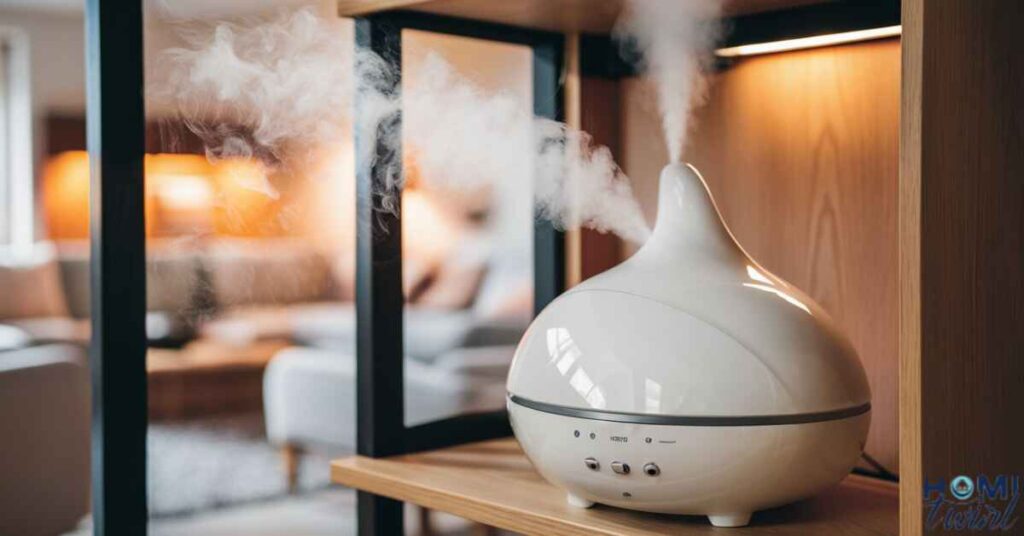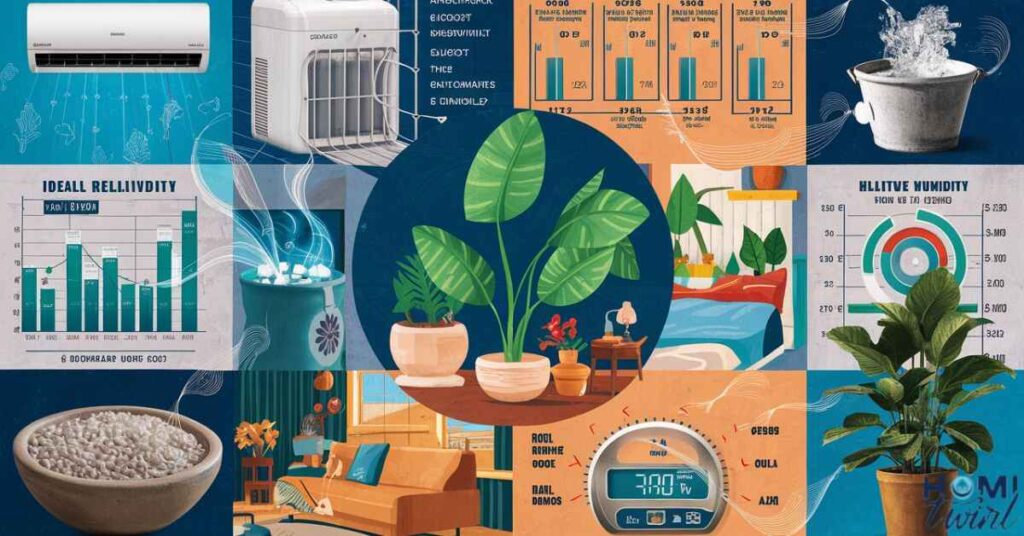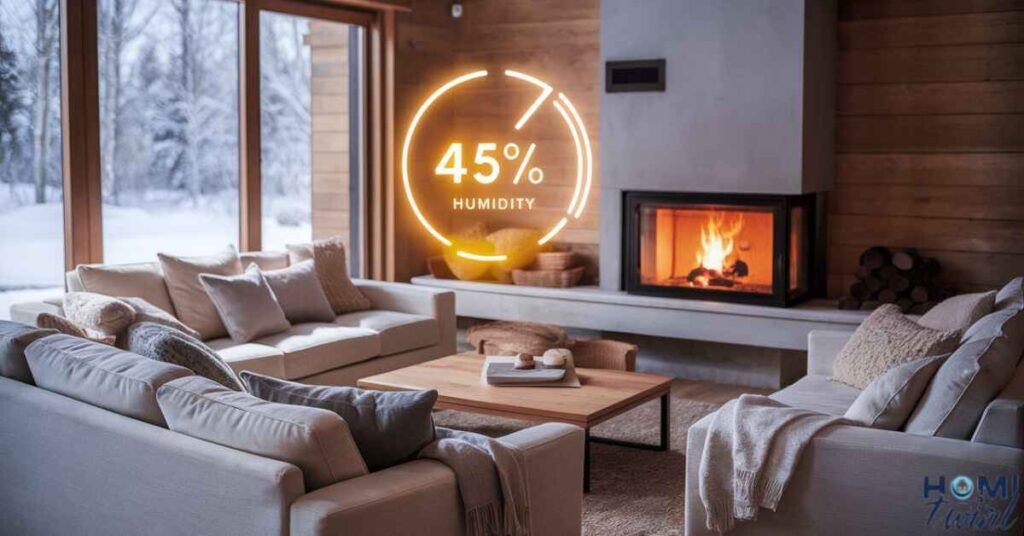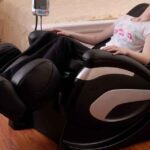Winter brings chilly temperatures and cozy nights by the fire, but it also brings dry air that can wreak havoc on your health and home.
Maintaining the right humidity level in your house during the winter is crucial for your comfort, health, and the preservation of your belongings.
In this comprehensive guide, we’ll explore the importance of humidity control in the winter months, provide tips for increasing or decreasing humidity as needed, and address common concerns.
Benefits Of Increasing Your Home’s Humidity

outdoor During the winter, the air inside your home can become excessively dry due to heating systems and cold temperatures. Here are some benefits of increasing your home’s humidity during this season.
- Improved health: Proper humidity levels can help prevent respiratory issues, such as dry throat and coughing, by keeping your mucous membranes moist.
- Healthier Skin: Dry air can lead to dry, itchy skin and exacerbate conditions like eczema. Increasing humidity can help alleviate these symptoms and keep your skin hydrated.
- Better Sleep: Adequate humidity levels can improve sleep quality by reducing nasal congestion and promoting relaxation.
- Protection for Furniture: Dry air can cause wooden furniture to crack and warp over time. By maintaining optimal humidity levels, you can protect your furniture and prolong its lifespan.
Read This Blog: WHAT IS A RAMBLER HOUSE
8 Tips for Increasing Humidity in the Winter
If you’re experiencing dry air in your home during the winter months, here are some tips to help you increase humidity:
- Use a Humidifier: Invest in a humidifier to add moisture to the air in your home. Choose between portable units for specific rooms or whole-house systems for comprehensive coverage.
- Place Bowls of Water Near Heat Sources: Place bowls of water near radiators or heating vents to allow evaporation to increase humidity levels.
- Hang Laundry to Dry Indoors: Take advantage of the moisture released during the drying process by hanging laundry indoors.
- Add Houseplants: Plants naturally release moisture through a process called transpiration, which can help increase humidity levels in your home.
- Take Shorter, Cooler Showers: Hot showers can contribute to dry air in your home. opt for shorter, cooler showers to minimize moisture loss.
- Cook with Lids On: Cooking with lids on pots and pans can trap steam and moisture, increasing humidity levels in the kitchen.
- Use a Stovetop Kettle: Boiling water on the stovetop not only adds moisture to the air but also provides a cozy atmosphere during the winter months.
- Seal Air Leaks: Prevent dry outdoor air from entering your home by sealing any cracks or gaps around windows, doors, and vents.
Humidifier Installation from Home Climates

Are you interested in installing a humidifier in your home to combat dry winter air? Estes Services offers professional humidifier installation services to ensure optimal indoor air quality and comfort. Our team of experts can assess your home’s humidity needs and recommend the right humidifier solution for your space. Say goodbye to dry, uncomfortable air and hello to a healthier indoor environment with Estes Services.
Contact Estes Services for Humidifier Installation
Don’t let winter dryness take a toll on your health and home. Contact Estes Services today to schedule your humidifier installation and start enjoying the benefits of properly humidified air all winter long.
Also Read This Blog: HOW TO FACTORY RESET GOOGLE HOME MINI
Prevent Winter Dryness
Maintaining the right humidity level in your house during the winter is essential for your well-being and comfort. By following the tips outlined in this guide and investing in a humidifier if needed, you can ensure that your home remains a cozy and healthy environment throughout the colder months.
What Humidity Should Your House Be in the Winter?
The ideal humidity level for your house during the winter depends on several factors, including outdoor temperature and personal preference. However, a general guideline is to aim for a relative humidity level between 30% and 50%.
What Is Relative Humidity and Why Does It Matter?
Relative humidity is the amount of moisture present in the air compared to the maximum amount of moisture the air can hold at a specific temperature. It’s essential to monitor relative humidity levels in your home to maintain a comfortable and healthy indoor environment.
What Are Ways That You Can Control the Humidity Inside Your Home?

Controlling humidity levels in your home can be achieved through various methods, including.
- Using humidifiers to add moisture to the air.
- Ventilating your home by opening windows and using exhaust fans.
- Sealing air leaks to prevent outdoor air from entering your home.
- Monitoring humidity levels with a hygrometer and adjusting accordingly.
By implementing these strategies, you can ensure that your home maintains optimal humidity levels throughout the winter season. Maintaining the right humidity level in your house during the winter is essential for your health, comfort, and the preservation of your belongings.
By following the tips provided in this guide and investing in a humidifier if needed, you can create a cozy and healthy indoor environment that you can enjoy all winter long.
Interested in Humidifier Installation?
If you’re experiencing dry air in your home during the winter months and are interested in improving indoor air quality and comfort, humidifier installation may be the solution you need.
Humidifiers are devices that add moisture to the air, helping to alleviate dry skin, respiratory issues, and other discomforts associated with low humidity levels.
At Estes Services, we specialize in professional humidifier installation to ensure that your home maintains optimal humidity levels throughout the winter season. Our team of experts can assess your home’s specific needs and recommend the right humidifier solution for your space.
Whether you’re looking for a portable unit for a single room or a whole-house system for comprehensive coverage, we have the expertise and experience to get the job done right.
Say goodbye to dry, uncomfortable air and hello to a healthier indoor environment with Estes Services. Contact us today to schedule your humidifier installation and start enjoying the benefits of properly humidified air all winter long.
Your comfort and well-being are our top priorities, and we’re here to help you create a cozy and healthy home environment that you can enjoy year-round.
What Is the Right Humidity Level During the Winter?

During the winter months, the right humidity level in your home can significantly impact your comfort, health, and the condition of your belongings. While the ideal humidity level may vary slightly depending on personal preference and specific environmental factors, a general guideline is to aim for a relative humidity level between 30% and 50%.
Maintaining a relative humidity level within this range offers several benefits.
- Comfort: Adequate humidity levels can help prevent dry skin, throat irritation, and nasal congestion, creating a more comfortable indoor environment for you and your family.
- Health: Optimal humidity levels can reduce the spread of respiratory viruses and bacteria, as well as alleviate symptoms of allergies and asthma. Moist air also helps keep mucous membranes moist, which is essential for respiratory health.
- Home Preservation: Proper humidity levels are crucial for preserving wooden furniture, floors, and musical instruments. Dry air can cause wood to crack and warp over time, leading to costly repairs or replacements.
- Energy Efficiency: Maintaining the right humidity level can also improve energy efficiency in your home. Humid air feels warmer than dry air, allowing you to lower your thermostat slightly without sacrificing comfort. This can result in energy savings and lower heating bills.
To determine the humidity level in your home during the winter, you can use a hygrometer, a device specifically designed to measure relative humidity. Place the hygrometer in various rooms throughout your home to get an accurate reading of the humidity levels.
If you find that the humidity level in your home is consistently outside the recommended range, consider implementing strategies to increase or decrease humidity as needed. These may include using humidifiers to add moisture to the air, ventilating your home to remove excess moisture, or sealing air leaks to prevent outdoor air from entering.
By maintaining the right humidity level in your home during the winter, you can create a more comfortable, healthy, and energy-efficient living space for you and your family to enjoy.
Signs Your Home Is Too Dry
Dry air in your home during the winter months can lead to a variety of discomforts and issues. Recognizing the signs that your home is too dry is essential for addressing the problem and maintaining a comfortable indoor environment. Here are some common signs that your home may be too dry.
- Dry, Itchy Skin: One of the most noticeable signs of low humidity is dry, itchy skin. If you find that your skin feels tight, flaky, or irritated, it could be a result of insufficient moisture in the air.
- Dry Eyes and Irritated Throat: Dry air can also cause your eyes to feel dry and irritated, and your throat to feel scratchy or sore. These symptoms are often more pronounced in the morning or when waking up.
- Increased Static Electricity: If you’re experiencing frequent static shocks when touching metal objects or other people, it could be a sign that the air in your home is too dry. Dry air allows static electricity to build up more easily.
- Chapped Lips: Dry, cracked lips are another common symptom of low humidity levels. If you find that your lips are constantly chapped, despite using lip balm, it could be a sign that your home is too dry.
- Frequent Nosebleeds: Dry air can irritate the mucous membranes in your nose, leading to frequent nosebleeds, especially during the winter months when indoor heating is used more frequently.
- Warped Wood and Furniture: Low humidity can cause wooden furniture, floors, and musical instruments to warp, crack, or split over time. If you notice that wooden surfaces in your home are starting to show signs of damage, it could be due to insufficient moisture in the air.
- Increased Allergy Symptoms: Dry air can exacerbate allergy symptoms by irritating the nasal passages and throat. If you find that your allergy symptoms are worsening, despite taking medication, low humidity levels in your home could be to blame.
- Difficulty Sleeping: Dry air can make it more difficult to fall asleep and stay asleep. If you’re experiencing restless nights or waking up frequently throughout the night, it could be due to discomfort caused by low humidity levels.
If you notice any of these signs in your home, it’s essential to take steps to increase humidity levels and improve indoor air quality. Using a humidifier, sealing air leaks, and incorporating houseplants into your home decor are all effective ways to add moisture to the air and alleviate the symptoms of dry air. By maintaining optimal humidity levels, you can create a more comfortable and healthier living environment for you and your family.
The Benefits of Installing a Whole House Humidifier in Your Atlanta Area Home

Installing a whole house humidifier in your Atlanta area home can provide numerous benefits, especially during the dry winter months. Here are some compelling reasons to consider investing in a whole house humidifier.
- Improved Health: Maintaining optimal humidity levels in your home can help prevent respiratory issues, such as dry throat, coughing, and sinus congestion. Proper humidity levels also reduce the spread of airborne viruses and bacteria, promoting a healthier indoor environment for you and your family.
- Healthier Skin: Dry air can lead to dry, itchy skin and exacerbate conditions like eczema. A whole house humidifier adds moisture to the air, helping to hydrate your skin and alleviate discomfort caused by dryness.
- Better Sleep: Adequate humidity levels can improve sleep quality by reducing nasal congestion and throat irritation, allowing you to breathe more easily and sleep more soundly throughout the night.
- Protection for Furniture and Flooring: Dry air can cause wooden furniture and flooring to crack, warp, or split over time. By maintaining optimal humidity levels, you can preserve the integrity of your furnishings and prevent costly damage.
- Energy Efficiency: Humidified air feels warmer than dry air, allowing you to lower your thermostat slightly without sacrificing comfort. This can result in energy savings and lower heating bills during the winter months.
- Reduced Static Electricity: Dry air increases static electricity buildup, leading to frequent shocks when touching metal objects or other people. A whole house humidifier can help reduce static electricity levels, making your home more comfortable and safer.
- Preservation of Musical Instruments: Instruments such as pianos, guitars, and violins are sensitive to changes in humidity and can suffer damage if exposed to excessively dry conditions. A whole house humidifier helps maintain stable humidity levels, protecting your valuable instruments from harm.
- Balanced Indoor Environment: Unlike portable humidifiers, which only humidify specific rooms, a whole house humidifier distributes moisture evenly throughout your entire home. This ensures a consistent and balanced indoor environment, free from dry spots or fluctuations in humidity levels.
In the Atlanta area, where winter temperatures can drop significantly, installing a whole house humidifier is a smart investment in your comfort, health, and home maintenance. Estes Services offers professional installation services to help you enjoy the benefits of properly humidified air all year round. Say goodbye to dry, uncomfortable air and hello to a healthier and more comfortable living environment with a whole house humidifier.
Frequently asked question
How do I know if my home needs a humidifier?
Look for signs of dry air, such as dry skin, static electricity, and frequent nosebleeds.
Can’t I just use a portable humidifier instead?
While portable humidifiers are effective for single rooms, a whole house humidifier ensures consistent humidity levels throughout your home.
Will a humidifier help with my allergies?
Yes, maintaining proper humidity levels can alleviate allergy symptoms by reducing nasal congestion and irritation.
Are there different types of whole house humidifiers available?
Yes, there are several types, including bypass, fan-powered, and steam humidifiers, each with its own benefits and considerations.
How often do I need to clean and maintain a whole house humidifier?
Regular maintenance is essential to prevent mold and bacteria growth, typically requiring cleaning every 1-2 months.
Will a humidifier increase my energy bills?
While a humidifier does use energy, the potential savings from reduced heating costs often outweigh the additional energy usage.
Can I install a whole house humidifier myself, or do I need professional installation?
Professional installation is recommended to ensure proper sizing, placement, and integration with your HVAC system for optimal performance and efficiency.
Conclusion
maintaining the right humidity level in your house during the winter is paramount for ensuring optimal comfort, health, and home preservation. With the dry air characteristic of winter months, maintaining humidity levels between 30% and 50% can alleviate a myriad of discomforts, from dry skin to respiratory issues.
Investing in a whole house humidifier, especially in regions like Atlanta where winters can be particularly dry, offers numerous benefits, including improved indoor air quality, energy efficiency, and protection for your belongings.
By prioritizing humidity control and implementing the strategies outlined in this guide, you can create a cozy, healthy, and balanced indoor environment that you and your family can enjoy throughout the winter season and beyond.







